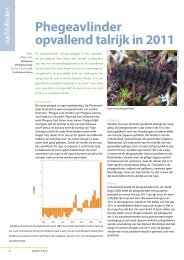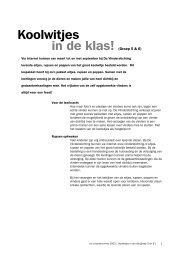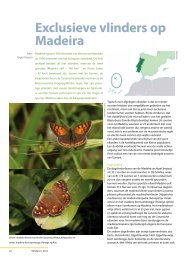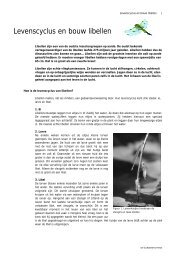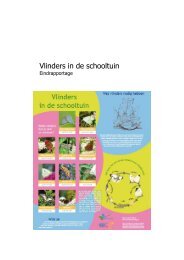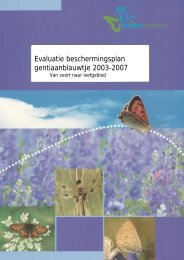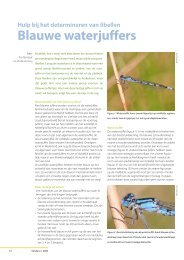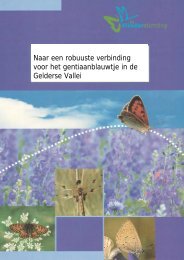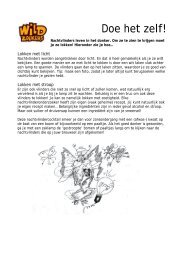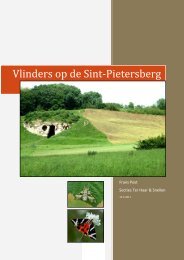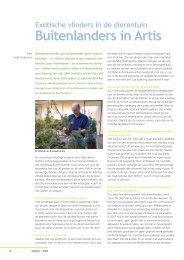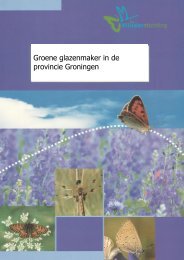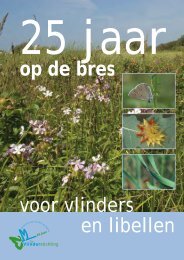Final Report October 2011 for the BBI-Matra/2008/015 ... - Vlindernet
Final Report October 2011 for the BBI-Matra/2008/015 ... - Vlindernet
Final Report October 2011 for the BBI-Matra/2008/015 ... - Vlindernet
Create successful ePaper yourself
Turn your PDF publications into a flip-book with our unique Google optimized e-Paper software.
Chapter 6 / Critical success factors<br />
The assumption in <strong>the</strong> log frame, that <strong>the</strong> Turkish government is able and willing to adopt<br />
<strong>the</strong> butterfly conservation priorities identified into national legislation and to en<strong>for</strong>ce <strong>the</strong>m,<br />
became invalid during <strong>the</strong> course of <strong>the</strong> project.<br />
During <strong>the</strong> period <strong>the</strong> project was being implemented, a major conflict developed<br />
between <strong>the</strong> Ministry of Environment & Forestry (now <strong>the</strong> Ministry of Environment, Forestry<br />
and Water Affairs) and NGOs, with <strong>the</strong> result that <strong>the</strong> Ministry will no longer work or<br />
cooperate with almost all NGOs. There are two main reasons <strong>for</strong> this:<br />
� The Ministry’s policy on <strong>the</strong> distribution of licenses <strong>for</strong> Hydro Electric Schemes(HES):<br />
NGOs are describing <strong>the</strong> HES as <strong>the</strong> single biggest threat to natural areas. There have been<br />
many court cases contesting specific schemes which have resulted in <strong>the</strong> Ministry and NGOs<br />
being on opposing sides.<br />
� The new Nature Law: this was initially prepared under GEF2 and with <strong>the</strong> support of<br />
<strong>the</strong> EU, but now includes many changes which do not reflect <strong>the</strong> contributions of NGOs. As<br />
it stands, although <strong>the</strong> Law includes some improvements which bring Turkish legislation<br />
more in line with that in <strong>the</strong> EU, it also helps <strong>the</strong> HES projects by removing some legal<br />
obstacles. For this reason more than 80 NGOs are opposing it.<br />
Thus, although relationships between DKM and technical staff at <strong>the</strong> Ministry remain good,<br />
<strong>the</strong> Ministry’s general policy has made it impossible <strong>for</strong> it to be officially represented in<br />
project activities.<br />
In <strong>the</strong> context of <strong>the</strong> project, this conflict and lack of active involvement has had little<br />
effect as it did not prevent <strong>the</strong> successful completion of all activities. However, in <strong>the</strong> longterm<br />
it is important that <strong>the</strong> project outputs are used to facilitate effective conservation and<br />
<strong>for</strong> this a change in government policy, making nature conservation a priority, is needed.<br />
The project’s most important critical success factor was <strong>the</strong> strength of its team. Despite a<br />
mid-project period when <strong>the</strong>re was no project assistant, regular voluntary support from <strong>the</strong><br />
whole DKM team made it possible <strong>for</strong> <strong>the</strong> project manager to share tasks and continue to<br />
implement activities as planned, thus ensuring <strong>the</strong> successful completion of <strong>the</strong> project and<br />
all its outputs.<br />
DE VLINDERSTICHTING & BCE <strong>2011</strong> | Butterfly Conservation in Turkey – <strong>Final</strong> report <strong>2011</strong> 59



